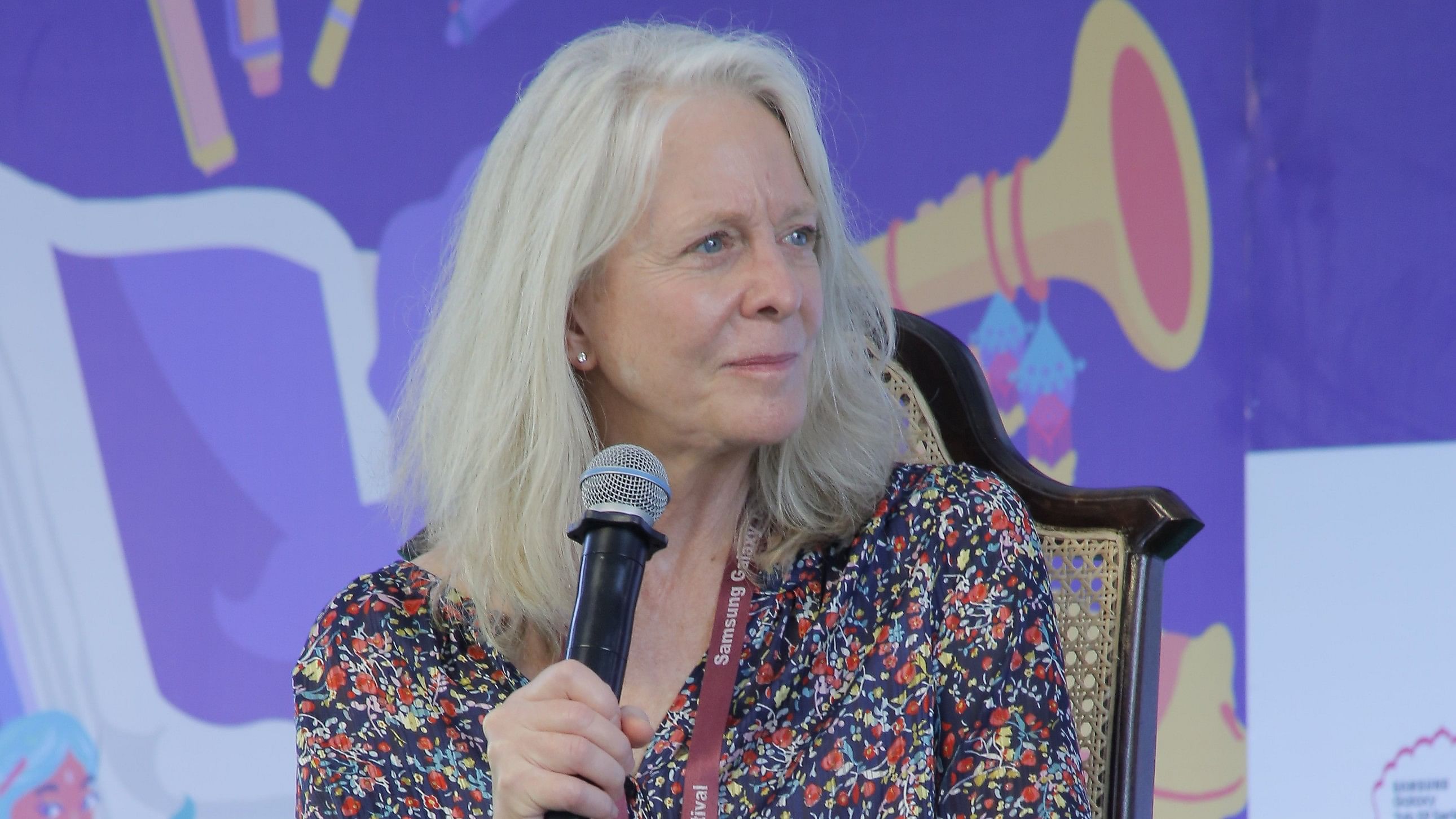
Bonnie Garmus.
Photo by author.
Getting published late in life, her work signals why it’s important to relentlessly pursue what you believe in, but it’s easier said than done. Garmus says, “My journey was probably a lot like that of other women — working full-time while raising a family, cleaning the house, mowing the lawn, cooking the meals, and being on call, twenty-four hours a day for whatever else might arise for work or family. My husband is a feminist; he definitely shared the load. But his work included a
lot of travel which meant our arrangement couldn’t ever be fifty-fifty. He worked in a male-dominated industry which didn’t endorse the notion that a man stay home when the kids were sick. So, yes, my novel’s success was definitely delayed. Plus, I was working as a copywriter and creative director, meaning I was already writing full-time for a living. Finding the energy and will to write even more when I got home was very tough. It wasn’t until I forced myself to get up early — at 4 or 5 am— that I could get novel writing done. Very few men ever have to make these choices. They have one job — the one they get paid for. Women have three jobs —the one they get paid for, the family job, and the upkeep-of-the-house job.”
This labour hardly gets acknowledged — not at home, not in the workplace. One such incident in a business meeting compelled Garmus to write her book. She shares, “I was presenting my concepts for a major campaign; something I’d done at least a hundred times in the past as a creative director. As per usual because this was technology, I was the only woman in the room. But following my presentation, there was no feedback — absolutely zero response — until a man in the meeting insisted that he had much better ideas. He then proceeded to reintroduce all my
ideas as his own, including reading from my Power Point slide, which was still being displayed. The other men in the room clapped and told him he was brilliant. I protested — loudly — but it was as if I didn’t exist. When I left the meeting, I was pretty angry. Walking down the hallway, I began to wonder how many other women around the world were having the same day I was. Five minutes later, I started writing Lessons in Chemistry.”
Such dismissals are what Elizabeth Zott, Garmus’ protagonist, experiences in this novel which is set in 1950s and 1960s America — a time when workplace conditions were even harsher for women. They were nearly invisible. Garmus chose this time frame for two principal reasons: “One, because I wanted to reassure myself that we’d moved forward as women since then, and we have, but not nearly enough. And two, because I’d just reread The Feminine Mystique by Betty Friedan and was thinking about how that era was so difficult and depressing for women — specifically because they were being told they ‘had it all’ when in fact, they had next to nothing in terms of career, choice, power, and freedom.”
Not only the setting but Zott’s profession (chemist, researcher) in the book also matters. It was “intentional”, Garmus notes for “science is the one area that knows women aren’t less; not mentally, not physically. Our bodies are different, but they’ve only been measured against the male body as if that’s the de facto standard. It is not. I wanted to set Zott in this world because she already knows —because science tells her — that she’s not less in any way. And yet the male
scientists around her insist she is, indicating that they’re not very good scientists. Calvin Evans, on the other hand, sees that she’s just as capable as he is — if not more. He respects and admires her for it. Calvin does not think women are less, but he also is a bit clueless as to why there aren’t more women in science. He assumes because there are so few women in science, they don’t like it. Unconscious bias strikes again!” To convey this bias, Garmus invents incidents, then lubricates them with wry humour, making Lessons in Chemistry an effortless read while covering every pressing issue facing society. Garmus concurs that humour helps in “exploring deeper themes. I personally don’t like reading preachy, didactic, dark books that offer no inspiration or hope. That’s why the underlying theme of my book is balance. Chemistry is the science of balance — you can’t have an unbalanced chemical equation. Rowing is the sport of balance — if you don’t balance your boat, you end up swimming. And there’s a balance of dark and light in the book — on purpose— because life isn’t only happy or dark. Today, we see the imbalance in countless ways — in climate change, sexism, racism, ageism, anti-LGBTQIA+ legislation, and in general intolerance for diversity. And yet nature abhors imbalance. So how does it arise in the first place? From scientific ignorance.” It is this awareness that shines through her book, which is why it’s populated with an interesting character: Six-Thirty, a thinking dog. “Animals do think,” Garmus asserts. “They form opinions; they process information; they make decisions based on experience. (Scientists tell us that even trees make decisions). For humans to ignore these basic facts (in fiction) is, again, a sign of scientific ignorance. So, when I was writing Six-Thirty, I wanted to remind the reader that we share this planet with other species — it is not ours alone — we don’t rule. Six-Thirty is the anthropologist in the book — he’s commenting on us and all the incredibly stupid decisions we make. But he also loves us.”
(The author is a Delhi-based writer who frequently reviews books and writes on gender. Instagram/Twitter:
@writerly_life.)